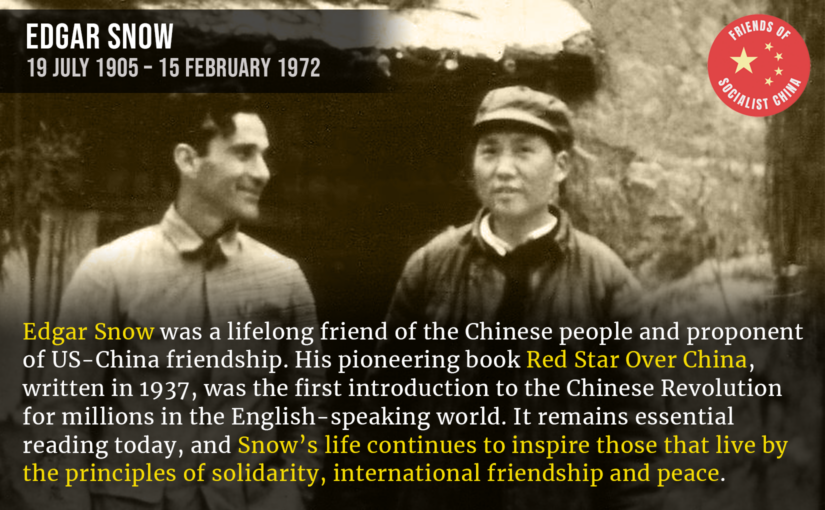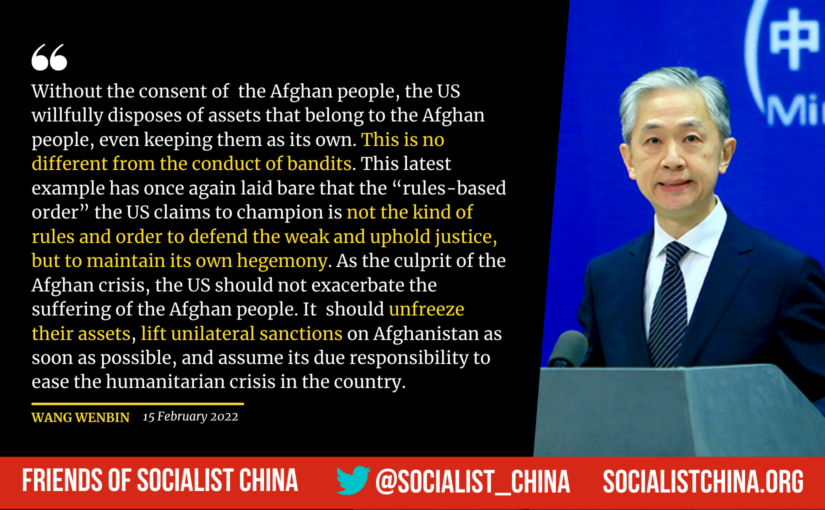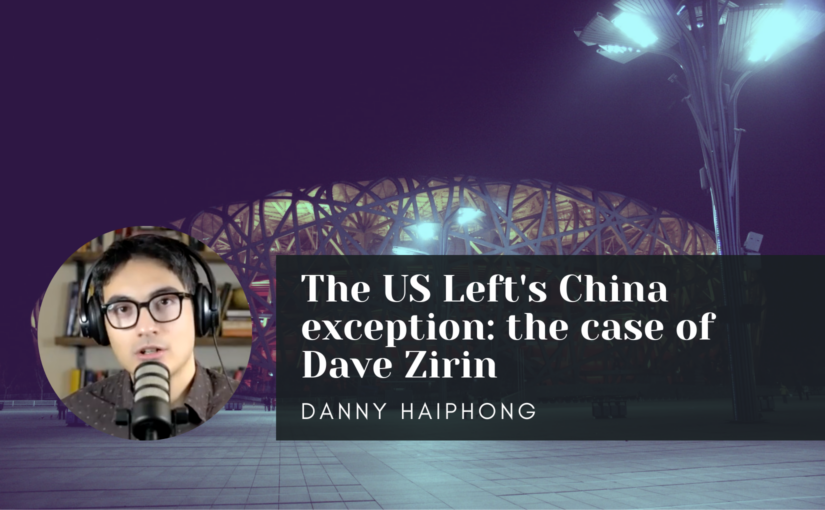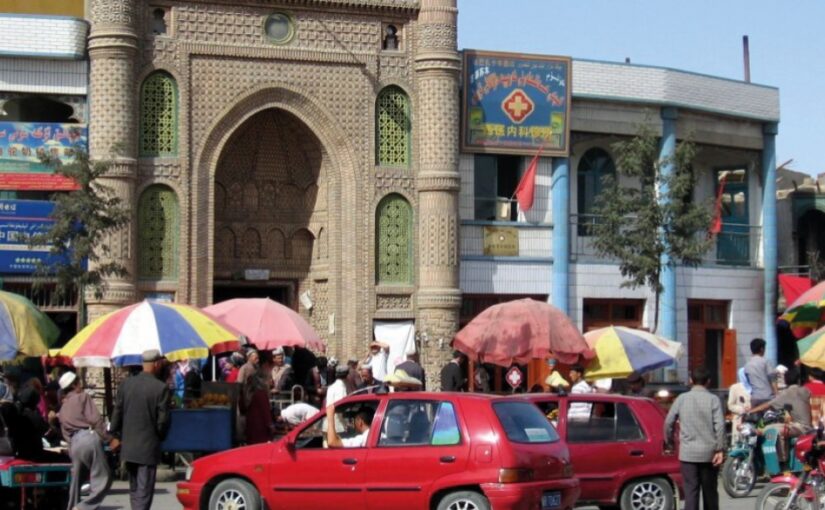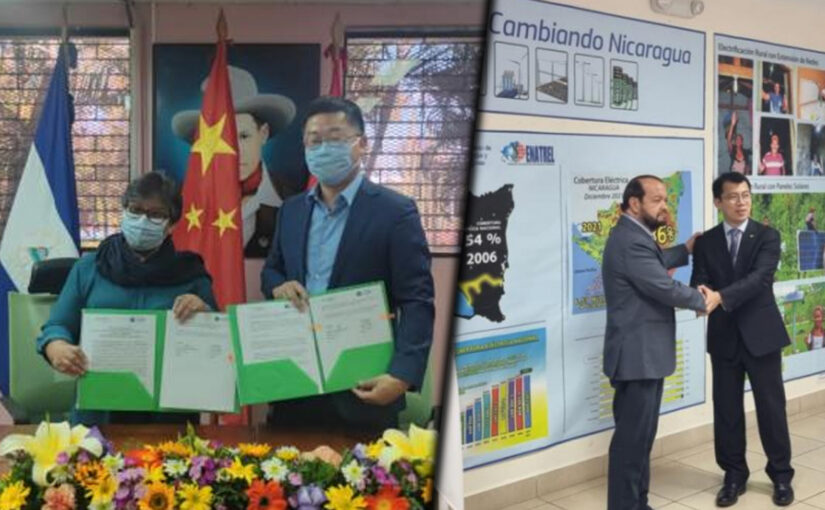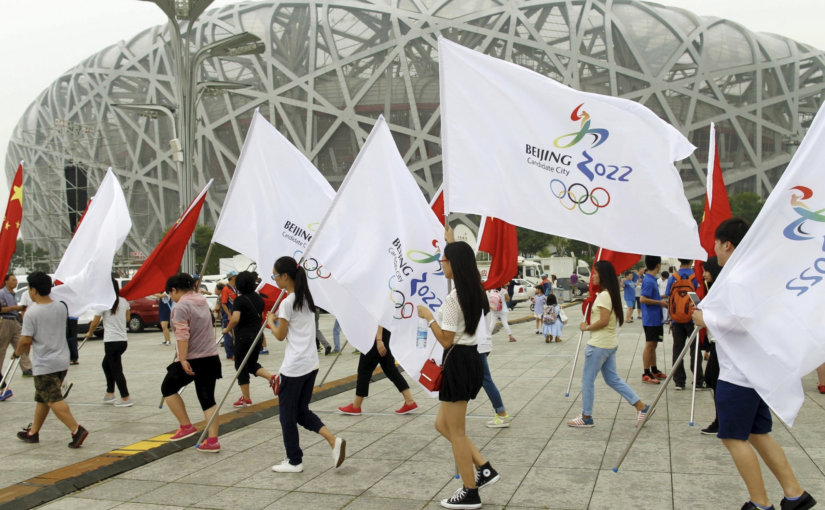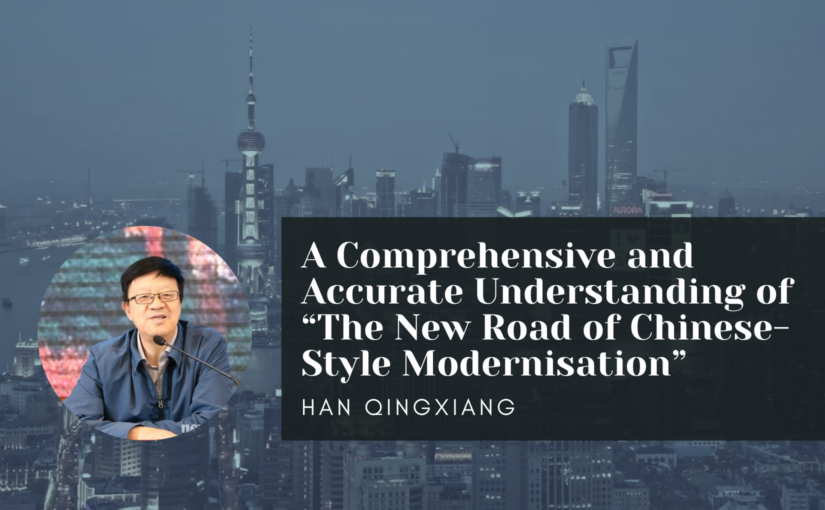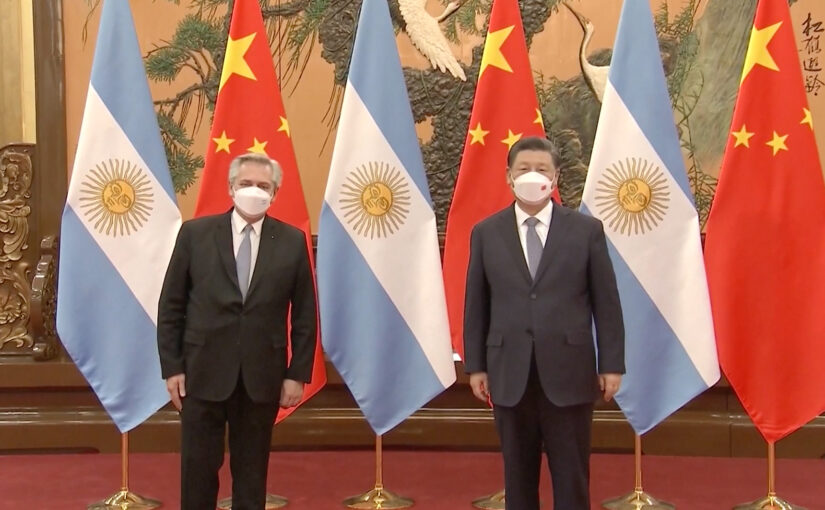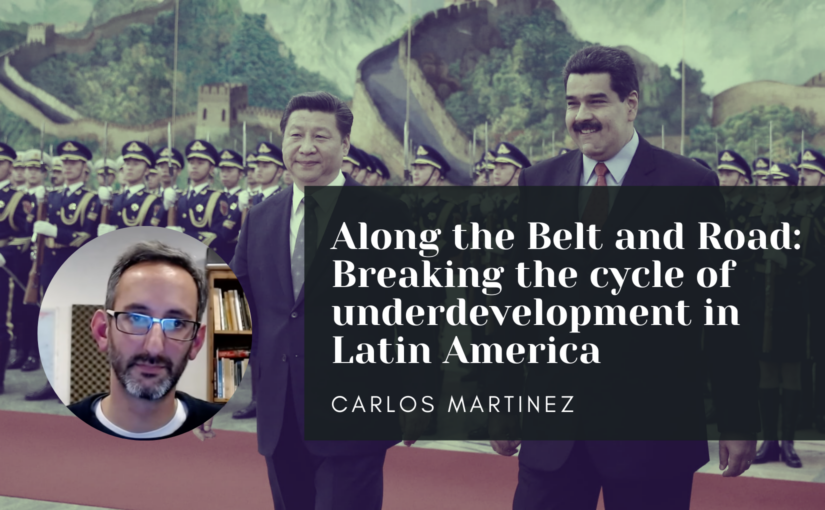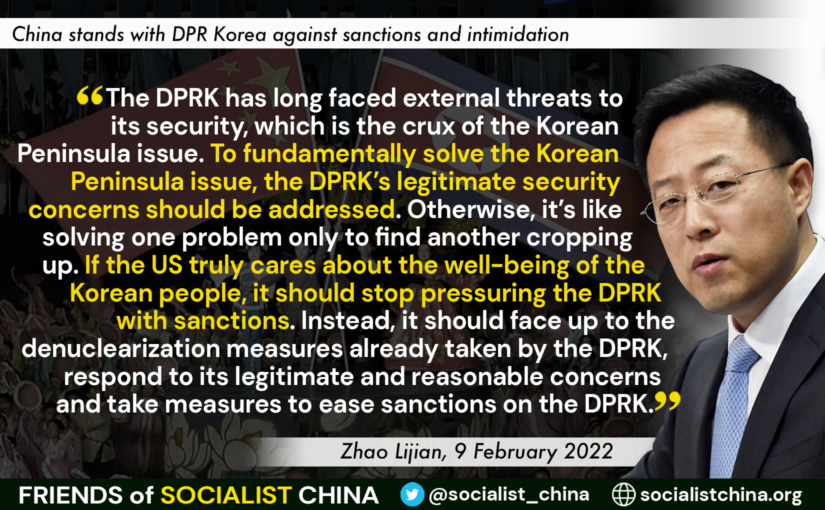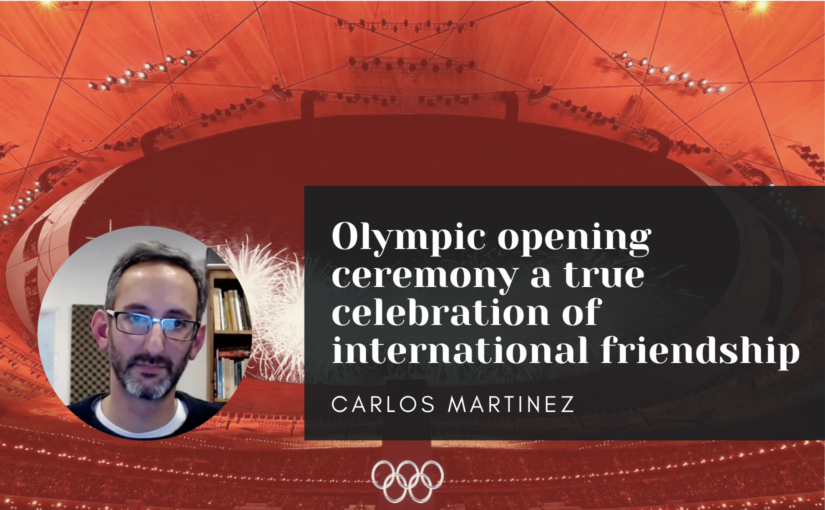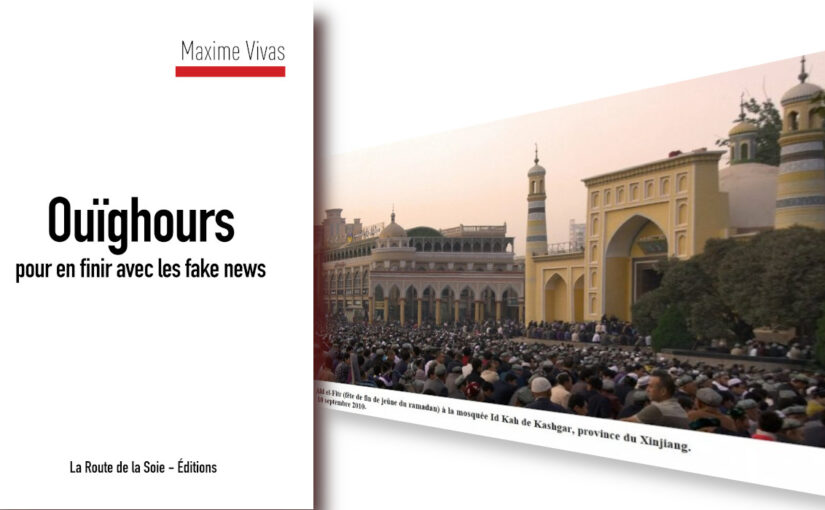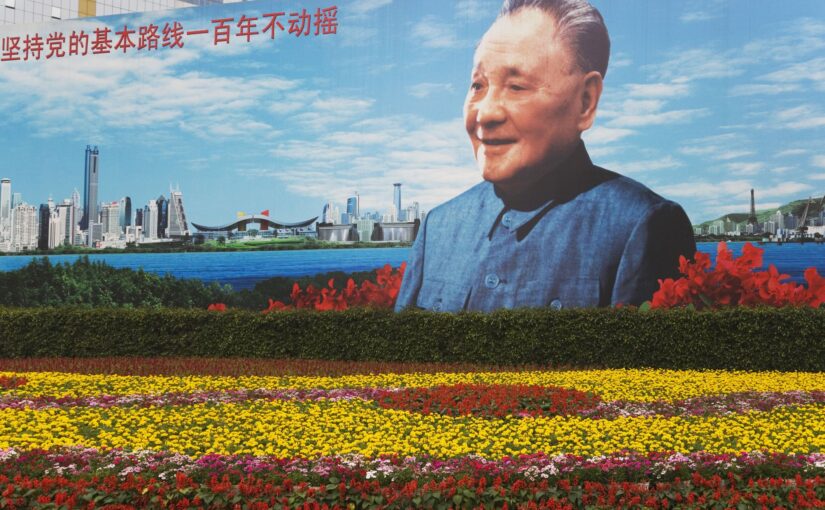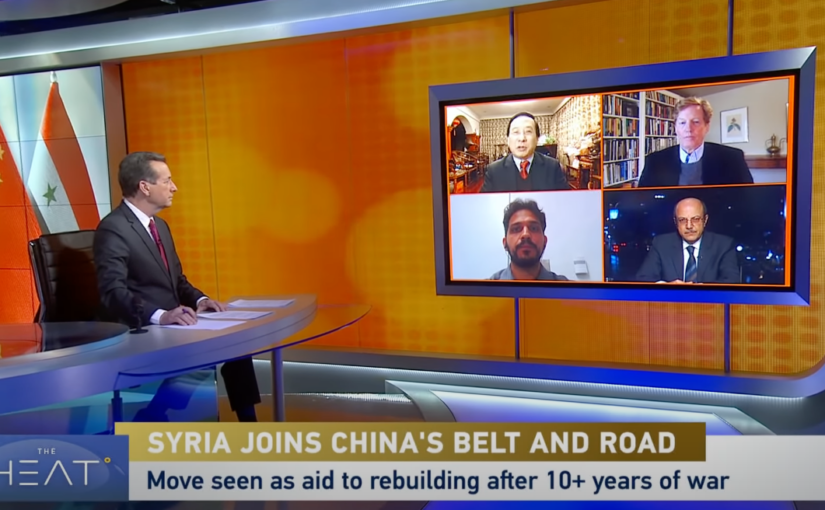On the 50th anniversary of his death, we celebrate the life of Edgar Snow, a lifelong friend of the Chinese people and proponent of US-China friendship. Snow’s pioneering book Red Star Over China, written in 1937, was the first introduction to the Chinese Revolution for millions in the English-speaking world. It remains essential reading today, and Snow’s life continues to inspire those that live by the principles of solidarity, international friendship and peace.
Month: February 2022
Wang Wenbin: US theft of Afghan assets is no different from the conduct of bandits
Without the consent of the Afghan people, the US willfully disposes of assets that belong to the Afghan people, even keeping them as its own. This is no different from the conduct of bandits. This latest example has once again laid bare that the “rules-based order” the US claims to champion is not the kind of rules and order to defend the weak and uphold justice, but to maintain its own hegemony. As the culprit of the Afghan crisis, the US should not exacerbate the suffering of the Afghan people. It should unfreeze their assets, lift unilateral sanctions on Afghanistan as soon as possible, and assume its due responsibility to ease the humanitarian crisis in the country.
Foreign Ministry Spokesperson Wang Wenbin’s Regular Press Conference on February 15, 2022
The US Left’s China exception: the case of Dave Zirin
We are very pleased to publish this important article by our co-editor Danny Haiphong, originally published on The Chronicles of Haiphong. Using the Beijing Winter Olympics as his starting point, Danny outlines how even some of the most respected voices on the American left have a tendency to drop their progressive values when it comes to China. Danny identifies this as the China Exception. Whilst doubtless a play on the concept of American Exceptionalism, the phenomenon identified and analysed by Danny can also be seen in other imperialist countries, not least in Britain.
I like Dave Zirin. I really do. Zirin is one of the few journalists who analyzes sports from a leftists perspective. His work generally brings a refreshing take on the ways race and class impact one of the most widely consumed areas of popular culture. This article is not a polemic of Zirin’s body of work but rather a demonstration of a troubling trend.
With that said, Zirin and his colleague Jules Boykoff at The Nation have repeatedly demonstrated what I call the China Exception on the American Left. The China Exception is the tendency for even principled left activists and journalists to make critical concessions to the U.S. establishment on the question of China. Those who commit to the China Exception repeat the subtle yet dangerous aspects of the U.S.’s New Cold War propaganda while claiming to be opposed to a “hot war” with China. The conclusion is always that is bad and doesn’t deserve solidarity from the American Left—not even in the form of concrete opposition to U.S. aggression.
Continue reading The US Left’s China exception: the case of Dave ZirinAre the Uighurs ‘slave labourers’?
We are pleased to republish this article by Dr Jenny Clegg, academic, author and veteran activist, originally published in the Morning Star. Jenny dissects the latest report on the situation in Xinjiang from the Australian Strategic Policy Institute (ASPI), whose funding by the US State Department, NATO, the British and Japanese governments, arms manufacturers and other dubious sources, utterly refutes its specious claim to be an “independent, non-partisan think tank”, with help from detailed analysis by CoWestPro Consultancy, which is also Australia-based. Jenny also advances the view that problems and shortcomings in China have to be viewed against its background as a developing country.
THE issue of Uighur forced labour is held up as a particularly pernicious abuse of human rights in China.
Prominent here has been the Australian Strategic Policy Institute (Aspi) 2020 report, Uyghurs For Sale, claiming that the Chinese government is orchestrating a forced Uighur labour programme.
Aspi counts the US Department of State, Nato, and a number of arms dealers among its largest donors — why an organisation oriented towards strategy and defence should take up the issue of forced labour is anybody’s guess.
Be that as it may, Aspi’s report has been used to support recent US legislation to ban goods made by Uighur labour. Now, with cries of “slave labour” from the likes of Tom Tugendhat leading the way, Britain may well follow suit with a similar Bill this year.
Continue reading Are the Uighurs ‘slave labourers’?China agrees to help Nicaragua develop infrastructure, hospitals, renewable energy
We are very pleased to republish this short article by Ben Norton, originally carried on Multipolarista, outlining the huge strides made in developing friendly relations and cooperation between Nicaragua and China since the two countries resumed diplomatic relations in December last year and especially since Nicaragua formally joined the Belt and Road Initiative last month. Major Chinese state owned companies will take the lead in a comprehensive program to develop hospitals, renewable energy, medical equipment, roads, railways and ports, as well as the water and public health systems, in the Central American nation.
The People’s Republic of China has come to an agreement with Nicaragua’s Sandinista government to develop infrastructure projects in the Central American country.
Top Nicaraguan officials announced on February 9 that they had signed a comprehensive memorandum of understanding with representatives from Beijing.
Under the agreement, China will help Nicaragua develop hospitals, renewable energy, medical equipment, roads, railways, and ports, as well as its water system and public health sector.
Continue reading China agrees to help Nicaragua develop infrastructure, hospitals, renewable energyBeijing 2022 and China’s challenge to sports imperialism
We are pleased to republish the full text of this insightful and thought-provoking article by Charles Xu of the Qiao Collective, originally published a few days before the opening of the Beijing Winter Olympics. In his article, Charles notes how New Cold War propaganda regarding Xinjiang, the case of tennis star Peng Shuai and China’s zero-Covid policies, have been deployed in the run up to the Games. He further links this to the long and deep-seated strain of racism, and specifically aristocratic white supremacy, in the modern Olympic movement and also outlines the history of China’s relationship to the Olympics from the days of Kuomintang rule through to Beijing becoming the first city ever to host both the summer and winter Games. HIs concluding section on the Games of the New Emerging Forces (GANEFO), organised in 1963 on the initiative of Indonesian President Sukarno, and in which the PRC played a crucial role, is particularly interesting. This was a time when an anti-imperialist Asian axis of Jakarta-Phnom Penh-Hanoi-Beijing-Pyongyang was often invoked. Some readers may note that the concept of New Emerging Forces continued to be frequently invoked by Korean President Kim Il Sung in his diplomatic and internationalist work over subsequent decades.
The incredible disappearing diplomatic boycott
On February 4, the 2022 Winter Olympics are set to open in Beijing. With this, the Chinese capital will become the first city to have hosted both the Summer and Winter Games. It will also make the People’s Republic of China the first country in the Global South ever to host the Winter Olympics, which have historically been dominated by Europe and North America (home to the top 14 countries in the all-time medal table). China remains the only Asian host nation in history besides Japan and South Korea, both of which are advanced capitalist states embedded firmly within the US economic and military sphere of influence.
These milestones have gone almost entirely unremarked-upon in Western media coverage leading up to the Games, which instead paints China as a uniquely “authoritarian” and therefore undeserving host. On this as with virtually every issue of geopolitical import, corporate media march in lockstep with their respective governments in their drive toward a new Cold War against China. The United States led the way in announcing a “diplomatic boycott” of the Beijing Olympics on December 6, 2021, citing allegations of “genocide and crimes against humanity in Xinjiang and other human rights abuses.” It was followed by Britain, Canada, and Australia (i.e. all but one of its “Five Eyes” allies), as well as Japan and a smattering of small north European countries.
Continue reading Beijing 2022 and China’s challenge to sports imperialismA Comprehensive and Accurate Understanding of “The New Road of Chinese-Style Modernisation”
We are pleased to publish this paper by Han Qingxiang, from the Party School of the Communist Party of China (CPC) Central Committee, who is also a member of the National Committee of the Chinese People’s Political Consultative Conference (CPPCC). Han presents a detailed outline and explanation of the CPC’s understanding of the new phase of China’s socialist modernisation, highlighting both the new aspects since the first phase of China’s reform and opening up, as well as the continuities, along with its antecedents in Marxist theory, specifically work by Marx and Engels in the 1840s and 1850s. The paper was delivered at the Cloud International Workshop on “New Forms of Human Civilization from a World Perspective,” held by the School of Marxism, Dalian University of Technology (DUT), 29-31 October 2021. We are grateful to the DUT Translation Team for their work, as well as to Professor Roland Boer for his meticulous sub-editing and cooperation.
General Secretary Xi Jinping’s speech at the celebration of the 100th anniversary of the founding of the Communist Party of China (referred to as the “7.1” speech) pointed out:
Following our own road – this is the firm foothold of all the theories and practices of our Party. More than that, it is the historical conclusion our Party has drawn from its struggles over the past century. Socialism with Chinese characteristics is a fundamental achievement of the Party and the people, forged through untold hardships and great sacrifices, and it is the correct path for us to achieve the great rejuvenation of China. By upholding and developing socialism with Chinese characteristics and promoting the coordinated development of material, political, spiritual, social and ecological civilisations, we have created a new Chinese-style path of modernisation and a new form of human civilisation.[1]
Here, from “following our own road” to “the road of socialism with Chinese characteristics” and then to “the new road of Chinese-style modernisation” provides a comprehensive exposition of the Chinese road’s formative and developmental logic, essential characteristics, important position, and comprehensive elaboration of global significance, all of which has rich political and scientific value.
Continue reading A Comprehensive and Accurate Understanding of “The New Road of Chinese-Style Modernisation”US enters dangerous era as it approaches one million Covid-19 deaths
Friends of Socialist China co-editor Danny Haiphong analyzes the significance of the US approaching 1 million Covid-19 deaths by Spring 2022. He concludes that the US has given up on the fight against the pandemic, a move rooted in more than two years of capitalist negligence. The biggest tragedy of all is that ordinary Americans have been stripped of their capacity to learn from and implement China’s effective covid-19 response within their own context. The article was originally published in CGTN on 11 February 2022.
The United States has been one of the most dangerous places to contract COVID-19 since the pandemic began two years ago. The current number of U.S. deaths to COVID-19 is estimated to be 908,000 and trending upward. Hospital beds, healthcare workers, and protective equipment remain in short supply. Both the U.S. political establishment and media continue to spread misinformation about the virus and demonize China to deflect attention from their self-inflicted pandemic disaster. Recent epidemiological forecasts predict that the United States will reach one million COVID-19 deaths by the end of the winter.
These troubling trends do not seem to bother the current political leadership in the United States. Several states are easing public health measures such as mask requirements. The New York Times front page on February 5 ran job growth as its top story while placing at the bottom an announcement that the U.S. had reached 900,000 COVID-19 deaths. The Times concluded that Americans are simply moving on from COVID-19. This contradicts U.S. President Joe Biden’s campaign message that 100,000 COVID-19 deaths were too many when the U.S. reached this milestone in May 2020.
Continue reading US enters dangerous era as it approaches one million Covid-19 deathsEileen Gu doesn’t care what you think – and no one else should, either
We are pleased to republish this article by Ian Goodrum, originally published in China Daily on 9 February 2022, comprehensively exposing the stark hypocrisy of those criticising Eileen Gu (Gu Ailing) for choosing to compete for China in the Beijing Winter Olympics.
Since she was 15, Eileen Gu (Gu Ailing) has had a target on her back.
The US-born freestyle skier of Chinese heritage announced in 2019 she would be competing for the People’s Republic at the 2022 Beijing Winter Olympics, a decision met with enthusiasm in China — for obvious reasons — but intense animosity on the other side of the Pacific. On social media, vile comments flooded in calling her every name under the sun. Gu was ungrateful, they said, and had spurned the country they felt was entitled to her labor.
That already venomous response shifted into overdrive this week, when Gu, now 18, won gold in women’s freeski big air. Her miraculous run included a career-first 1620 in competition, barely edging out her nearest opponent and sending her name into the stratosphere.
Continue reading Eileen Gu doesn’t care what you think – and no one else should, eitherTrapped in IMF debt, Argentina turns to Russia and joins China’s Belt and Road
In this recent article, first published in Multipolarista, Ben Norton discusses Argentine President Alberto Fernandez’s recent trip to Russia and China, where he agreed on a number of significant deals on trade, investment and health cooperation. The trip was explicitly framed in terms of a turn towards multipolarity and away from dependence on the US and IMF.
The United States constantly intervenes in the internal affairs of Latin America, organizing coups d’etat, destabilizing independent governments, trapping nations in debt, and imposing sanctions. Washington sees the region as its own property, with President Joe Biden referring to it this January as “America’s front yard.”
Seeking alternatives to US hegemony, progressive governments in Latin America have increasingly looked across the ocean to form alliances with China and Russia.
Argentina’s President Alberto Fernández did exactly that this February, taking historic trips to Beijing and Moscow to meet with his counterparts Xi Jinping and Vladimir Putin.
Fernández signed a series of strategic agreements, officially incorporating Argentina into Beijing’s international Belt and Road Initiative, while expanding economic partnerships with the Eurasian powers and telling Moscow that Argentina “should be the door to enter” Latin America.
China offered $23.7 billion in funding for infrastructure projects and investments in Argentina’s economy.
In the meetings, Fernández also asked for Argentina to join the BRICS framework, alongside Brazil, Russia, India, China, and South Africa. Xi and Putin reportedly both agreed.
“I am consistently working to rid Argentina of this dependence on the IMF and the US,” Fernández explained. “I want Argentina to open up new opportunities.”
The Argentine president’s comments and meetings with Putin and Xi reportedly angered the US government.
Argentina is trapped in odious debt with the US-controlled IMF
Argentina is a Latin American powerhouse, with significant natural resources and the third-largest economy in the region (after Brazil and Mexico, both of which have significantly larger populations).
But Argentina’s development has often been weighed down by debt traps imposed from abroad, resulting in frequent economic crises, cycles of high inflation, and currency devaluations.
The International Monetary Fund (IMF) – a de facto economic arm of the United States, over which Washington alone has veto power – has significant control over Argentina, having trapped the nation in huge sums of odious debt.
In 2018, Argentina’s right-wing President Mauricio Macri requested the largest loan in the history of the IMF: a staggering $57.1 billion bailout.
Macri was notorious for his corruption, and this was no secret at the time. By agreeing to give such an enormous sum of money to Macri’s scandal-plagued government, the IMF knew it was ensnaring Argentina in debt it would not be able to pay off. But this was far from the first time the US-dominated financial instrument had trapped Argentina in odious debt.
In December 2021, the IMF published an internal report admitting that the 2018 bailout completely failed to stabilize Argentina’s economy.
But when Argentina’s center-left President Alberto Fernández entered office in December 2019, his country was ensnared in $44.5 billion in debt from this bailout that the IMF itself admitted was a total failure. ($44.5 billion of the $57.1 billion loan had already been disbursed, and Fernández cancelled the rest.)
The Argentine government has tried to renegotiate the debt, but in order to do so the IMF has imposed conditions that severely restrict the nation’s sovereignty – such as appointing a British economist who “will virtually be the new economic minister,” acting as a kind of “co-government,” warned prominent diplomat Alicia Castro.
Seeking ways around these US debt traps, Fernández decided this February to turn to the two rising Eurasian superpowers.
Argentine President Fernández travels to Russia to meet with Putin
On February 3, Argentine President Alberto Fernández travelled to Russia to meet with President Vladimir Putin.
“I’m certain Argentina has to stop being so dependent on the [International Monetary] Fund and the United States, and has to open up to other places, and that is where it seems to me that Russia has a very important place,” Fernández said, explaining his motivation for the trip.
Fernández added that, for Russia, Argentina “should be the door to enter” the region, telling Putin, “We could be a venue for the development of your cooperation with Latin American nations.”
The two leaders discussed Russian investment in the Argentine economy, trade, railroad construction, and energy technology.
Fernández also thanked Moscow for collaborating with his country in the production of its Sputnik V covid-19 vaccine. Argentina was the first country in the western hemisphere to do so.
The Argentine president even pointed out in their meeting that he has received three doses of the Sputnik V vaccine. Putin added, “Me too.”
Putin said the two countries agree on many issues, calling Argentina “one of Russia’s key partners in Latin America.”
Argentine President Fernández travels to China to meet with Xi
Just three days after meeting with Putin, President Alberto Fernández travelled to China on February 6 to meet with President Xi Jinping.
In this historic trip, Argentina officially joined Beijing’s Belt and Road Initiative, a massive global infrastructure program.
Fernández and other top Argentine officials signed agreements for $23.7 billion in Chinese financing, including investments and infrastructure projects.
The funding will be disbursed in two parts: one, which is already approved, will provide Argentina with $14 billion for 10 infrastructure projects; the second, for $9.7 billion, will finance the South American nation’s integration into the Belt and Road.
There are three joint Chinese-Argentine projects that were reportedly at the top of Fernández’s list: creating 5G networks, developing Argentina’s lithium industry, and building the Atucha III nuclear power plant.
Fernández also discussed plans for Argentina to produce China’s Sinopharm covid-19 vaccine, in addition to Russia’s Sputnik V.
Argentina and China signed a comprehensive memorandum of understanding, including 13 documents for cooperation in areas such as green energy, technology, education, agriculture, communication, and nuclear energy.
Fernández and Xi discussed ways to “strengthen relations of political, commercial, economic, scientific, and cultural cooperation between both countries,” according to an Argentine government readout of the meeting.
The two leaders apparently hit it off very well, with Fernández telling Xi, “If you were Argentine, you would be a Peronist.”
Argentina’s incorporation into the Belt and Road comes mere weeks after Nicaragua joined the initiative in January, and Cuba in December.
Latin America’s growing links with China and Russia show how the increasingly multipolar international system offers countries in the Global South new potential allies who can serve as bulwarks against and alternatives to Washington’s hegemony.
While right-wing leaders in Latin America keep looking north to the United States as their political compass, progressive governments are reaching across the ocean to the Eurasian powers of China, Russia, and Iran, building new international alliances that weaken Washington’s geopolitical grip over a region that the US president still insists is its “front yard.”
Along the Belt and Road: Breaking the cycle of underdevelopment in Latin America
The following article by Carlos Martinez was commissioned by the Taihe Institute for the January 2022 edition of its monthly magazine, TI Observer. Carlos gives an overview of the history of European and North American subjugation of Latin America, and explores the ways in which the expanding relationship between China and the region is helping to break the cycle of underdevelopment and poverty.
There is an audio version of this article available on the TI Observer podcast.
The last few months have seen a significant expansion of the Belt and Road Initiative in Latin America and the Caribbean. Although this region of the world is not the most obvious fit for an undertaking that was originally modelled on the Silk Road – a network of trade routes linking East Asia with the Middle East, Africa and Europe – the reality is that the countries of South America, Central America and the Caribbean share many of the same needs as their counterparts in Central Asia, Southeast Asia, the Middle East and Africa.
Most Latin American countries won their formal independence from Spanish and Portuguese colonialism in the 19th century, but they found themselves in the shadow of an incipient North American imperialism. The Monroe Doctrine, first articulated by President James Monroe in 1823, denounced European colonialism and interference in the Western Hemisphere, not on the basis of anti-colonial principle but with a view to buttressing US hegemonic designs. Since that time, the US has tended to consider Latin America as its ‘backyard’ – a collection of countries subjected to the control (direct or indirect) of Washington.1
Eduardo Galeano wrote that the transition from colonialism to neocolonialism made little difference to Latin America’s position within the global capitalist economy. “Everything from the discovery until our times has always been transmuted into European – or later, United States – capital, and as such has accumulated on distant centres of power. Everything: the soil, its fruits and its mineral-rich depths, the people and their capacity to work and to consume, natural resources and human resources.”2
Continue reading Along the Belt and Road: Breaking the cycle of underdevelopment in Latin AmericaZhao Lijian: China stands with the DPRK against sanctions and intimidation
The DPRK has long faced external threats to its security, which is the crux of the Korean Peninsula issue. To fundamentally solve the Korean Peninsula issue, the DPRK’s legitimate security concerns should be addressed. Otherwise, it’s like solving one problem only to find another cropping up. If the US truly cares about the well-being of the Korean people, it should stop pressuring the DPRK with sanctions. Instead, it should face up to the denuclearization measures already taken by the DPRK, respond to its legitimate and reasonable concerns and take measures to ease sanctions on the DPRK.
Foreign Ministry Spokesperson Zhao Lijian’s Regular Press Conference on February 9, 2022
Eileen Gu controversy exposes the importance of racial loyalty to the American empire
This article by Friends of Socialist China co-editor Danny Haiphong, originally published on The Chronicles of Haiphong, unpacks the hysteria surrounding the decision of the young Chinese-American ski champion Eileen Gu (Gu Ailing) to represent China rather than the US at the Winter Olympics. Danny explains how the intense hostility Gu’s decision has generated in the US has its origins in the New Cold War, American exceptionalism, imperialism, and white supremacy.
Eileen Gu is a world class skier who has already won her first gold medal in the Beijing 2022 Winter Olympics at the age of 18. Gu was raised in San Francisco by a mixed-race family. Her mom, who she posts about often on social media, is Chinese. In 2019, Gu announced that she planned to represent the Chinese national team for the Beijing 2022 Winter Olympic Games. But it is only within the last few weeks as the Winter Olympics prepared to launch that her decision began to stir a considerable amount of controversy. Gu has been labeled an ungrateful “traitor” to the United States for supposedly spurning the opportunities offered to her in the “land of the free.”
The vitriol directed at Gu has come from all corners of U.S. society. Former Olympic skier Jen Hudak told the media that Gu “became the athlete she is because she grew up in the United States, where she had access to premier training grounds and coaching that, as a female, she might not have had in China.” Popular right-wing talk show host Tucker Carlson claimed that Gu “renounced” her citizenship and betrayed her own country by choosing to ski for China.
A report in The Economist framed Gu’s decision as an agonizing moment for the teenage phenom who finds herself split between two countries engaged in a “superpower rivalry.” No evidence for this claim was provided in the article. Corporate media commentary has repeatedly emphasized that Gu was “born in the USA” while social media users on the far right have openly called for the Olympic skier to leave the country for her act of betrayal.
The intense reaction to Gu comes amid a tireless U.S. effort to delegitimize China in the lead up to the Beijing 2022 Winter Olympics. U.S. President Joe Biden announced a “diplomatic boycott” of the Games last December, a relatively meaningless gesture that saw more than dozen State Department officials apply for visas to travel to the Games shortly after the policy went into effect. A non-stop propaganda blitz helped pass the Uyghur Forced Labor Prevention Act a few weeks later. The bill effectively sanctions U.S. corporations from doing business in China’s Xinjiang Uyghur Autonomous Region by requiring proof that products imported from the region are not made from “forced labor.” These policy moves just skim the surface of the U.S.-led New Cold War on China and its many forms of aggression in the military, diplomatic, economic, and information realms.
As I penned in a previous column, fear is a critical component of the U.S.’s racist and imperialist attacks on China. House Speaker Nancy Pelosi summed up modern American fear of China when she warned U.S. athletes on the day of the opening ceremony not to speak out against China for fear that its “ruthless” government would seek reprisal. Pelosi’s characterization of China fits one side of casual racism’s double-edged sword. Fear of China’s supposedly unmatched ruthlessness is complimented by a ceaseless suspicion of China’s COVID-19 response, poverty alleviation program, and overall political and economic stability. China is all-powerful yet never successful; a menace to the “free world” but on a never-ending road to collapse.
The U.S.-led New Cold War is an imperialist project. At its core is a ceaseless effort to undermine and eventually overthrow China’s socialist economic and political system. More visible to the naked eye is the palpable fear expressed by Western capitalists of China’s economy surpassing the U.S. in GDP terms over the next half decade. War profiteers have benefitted immensely from the New Cold War. The U.S. military budget continues to grow, with special funds set aside for countering the so-called “China threat.”
Of course, the New Cold War is also a reflection of a long history of imperialist aggression toward China dating back to the Opium Wars of the mid-19th century. The Opium Wars carved up China and left the nation impoverished and weak. Western imperialists justified plunging China into a “century of humiliation” with Yellow Peril racism. The Chinese were routinely dehumanized and portrayed in Western media as sneaky thieves and rapists who deserved to be deported or worse. Yellow Peril justified the passage of racist immigration laws which increased the rate of exploitation and violently managed the flow of surplus labor migrating from China.
China and Chinese people were only useful to the West so long as they were weak and subservient. This all changed after the Chinese revolution of 1949 sent shockwaves throughout the Western capitalist world. U.S. officials lamented over “losing China” to communism. China was placed under sanctions from 1949-1971 by the United States and threatened with nuclear war more than once.
However, Cold War imperialist aggression was unsuccessful in destabilizing China. To paraphrase Mao Zedong, the Chinese people stood up in 1949 and are showing no signs of sitting back down to their former oppressors. China’s achievements in poverty alleviation, public health, renewable energy, high-technology, and a myriad of other fields have changed the course of history. A multipolar world is emerging where non-white, formerly colonized nations assert their self-determination in the midst of a declining imperialist order. China is leading the way.
Racial loyalty is an expression of both conscious and unconscious resentment toward these developments and plays a central role in the anger over Gu’s decision to represent China. To many in the United States, Gu has chosen the side of the “savages” and the “wretched of the earth.” She has rejected the United States as her white motherland. The overriding perception is that the U.S.’s superiority is as inherent as China’s supposed inferiority, making Gu’s decision a clear pledge of loyalty to a country inhabited by 1.4 billion non-white people and 90-plus million members of the Communist Party of China. In the eyes of her detractors, Eileen Gu is not just an ungrateful immigrant but an assault on American exceptionalism itself.
Such a view is entirely irrational once the blinders of racism are taken off. Gu is deeply connected to China on a personal and professional level. She is fluent in Mandarin and spends most summers in Beijing visiting loved ones. Gu is a Chinese citizen and has several Chinese sponsors. Her mother works for an investment firm in China.
In addition to her connections to China, it is obvious that Gu is developing her moral compass and views her actions as bigger than herself. She has been an outspoken advocate on issues of anti-Asian racism and gender equality. In her Instagram post announcing the decision to ski for China, Gu informed her audience that she hopes to “unite people, promote common understanding, create communication, and forge friendship between nations.”
This is a powerful message that demonstrates Gu is less interested in geopolitics as she is about using her platform to promote peace and mutual understanding.
Of course, racism is never about the facts. Racism makes people see things that are not there and create problems that do not exist. The reaction to Gu is a manifestation of the ongoing importance of racial loyalty to the American Empire. Americanism has always been synonymous with white imperialist power, both in identity terms and through politics. Those who are perceived to cross the boundaries of political whiteness are traitors to the empire’s civilizing mission to dominate, exploit, and plunder in the name of “freedom” and have crossed the line into enemy territory.
I personally identify with the attacks on Eileen Gu. Growing up as a Vietnamese-American of mixed race, I constantly felt that my racial loyalty to the empire was being tested by peers and institutions. Most people saw me as nothing but a “gook” or a “chink,” a target of imperialist wars of prior generations. The message from American society was clear as a young person: I could either put my head down and embrace the white American side of my family or face the threat of violence from white peers who took issue when I would speak up to their racist demagogy. When I would embrace my status as a subordinate and link with those of oppressed racial and national backgrounds, teachers would ask me why I chose to spend time with “knuckleheads” at the expense of my “potential.”
The U.S. is a racist society. No matter how “mixed-race” the U.S. becomes, white supremacy demands that the masses make political decisions based upon their loyalty to the American imperialist project. Racial loyalty subsumes class contradictions in a sea of confusion and directs political energy toward the destruction of an enemy “other.” Majorities of Americans Westerners have been convinced that China and its people are their enemies.
Eileen Gu has exposed how racial loyalty to the United States remains a prominent feature of a declining empire. Her positive message of peace and cooperation is viewed by many as an act of betrayal to her American citizenship—a euphemism for whiteness. White supremacy is inextricably bound with the Cold War 2.0. being led by the United States and its junior partners. Gu’s desire for common understanding among nations is unattainable unless white supremacy is confronted and thrown into the dustbin of history along with the system of imperialism that gave it birth.
Olympic opening ceremony a true celebration of international friendship
The following brief comment was submitted by Friends of Socialist China co-editor Carlos Martinez in response to a request from People’s Daily. It was quoted in a report in the Chinese edition on 5 February 2022.
The opening ceremony was spectacular and inspiring, a true celebration of international friendship and the Olympic spirit. Even in Britain and the US – countries that have imposed a so-called diplomatic boycott on these games – television commentators were obviously highly impressed with the technical and aesthetic excellence of the ceremony, as well as the overall atmosphere of excitement and solidarity.
It was fascinating to see the Bird’s Nest transformed from 2008. The stadium now seems perfectly suited to the Winter Olympics, and its reuse reminds us that the organisers have been very mindful of the need to make these Olympics the greenest in history, at a time when the global struggle against climate breakdown has become widely recognised as one of the most serious threats facing humanity. All the venues are powered exclusively by renewable energy and, of the seven venues, five are legacy venues that been repurposed for these games. Furthermore, the vehicles transporting participants, staff, officials and spectators run on zero- or low-carbon energy. Such innovations serve to showcase China’s increasing leadership on environmental issues.
Continue reading Olympic opening ceremony a true celebration of international friendshipThe Black Alliance for Peace condemns the “America COMPETES Act” passed in House of Representatives
The following press release from Black Alliance for Peace, issued on 7 February 2022, correctly identifies the new ‘America COMPETES Act’ as a weapon of Cold War, aimed at strengthening US hegemony and subverting the rise of a democratic, multipolar world order.
February 7, 2022. On Friday evening, February 4th, the U.S. House of Representatives passed the America COMPETES Act of 2022 (H.R. 4521). The stated intent of the legislation is to strengthen “America’s national and economic security and the financial security of families, and advance our leadership in the world.” While this claim, found in Nancy Pelosi’s press statement on January 20th, seems to be addressing some of the most important political and economic issues currently plaguing the United States, from the supply chain to the shortage of semiconductors, the Black Alliance for Peace sees this piece of legislation as sinophobic and militaristic, and that only strengthens the imperialist designs of U.S. foreign policy.
Continue reading The Black Alliance for Peace condemns the “America COMPETES Act” passed in House of RepresentativesBook review: Uyghurs – to put an end to fake news
We are pleased to republish this summary of the French-language book, ‘Uyghurs: To put an end to fake news’, reviewed by Roger Keenan on the website Marxism-Leninism Today. Written by Maxime Vivas, a writer, journalist and former postal worker, the book refutes new cold war propaganda and presents the true situation, based on the author’s research as well as his travel to Xinjiang.
The United States government is ratcheting up a cold war against China. The Biden administration’s agreement to supply Australia with nuclear submarines, its decision to create a new department in the CIA aimed at countering China, and its recent decision to impose a diplomatic boycott on the Chinese Winter Olympics are just three recent signs of the aggressive posture taken by the U.S. in the new cold war. A key part of the new cold war is a tidal wave of ideological attacks on China aimed at showing that China is a threat—to human rights, democracy, women’s rights, labor rights, and American security. All of this is geared to justify American belligerence toward China and generate support for this belligerence and a frightened public’s willingness to pay for it. (Recently the Senate passed a bill previously passed by the House calling for $768 billion appropriation of Defense Department, $24 billion more than either Biden or the Pentagon sought.) A centerpiece of this ideological offensive that the mass media amplifies on a daily basis is that China is committing genocide against its Moslem Uyghur minority in the Xinjiang autonomous region.
Even though most politicians, as well as the general population, have no idea who the Uyghurs are, where Xinjiang is on a map, what Chinese policy toward the Uyghurs is, or even how to pronounce Uyghur, they buy the idea of Uyghur genocide. The widespread ignorance makes Maxime Vivas’s book so valuable. Vivas not only provides a primer on the Uyghurs and Xinjiang, but also explains the Chinese policy in Xinjiang, and makes a forceful argument that the charge of genocide is of apiece with other lies like those about Iraqi weapons of mass destruction that serve to justify American imperial belligerence.
Continue reading Book review: Uyghurs – to put an end to fake newsHere’s why Soros’ attack on China is illogical and historically ignorant
We are pleased to republish this informative article by Bradley Blankenship, originally carried by RT, refuting the recent call by billionaire currency speculator George Soros for ‘regime change’, that is counter-revolution, in China. Blankenship’s article is particularly valuable in that it demolishes the attempt to juxtapose Xi Jinping’s leadership and programme to that of Deng Xiaoping, the architect of China’s hugely successful reforms. In Blankenship’s words, “to state the obvious, Deng Xiaoping was a committed communist. There’s no doubt about it.”
Billionaire George Soros, the founder of the Open Society Foundations, gave a speech this week to the conservative Hoover Institution in which he compared China under President Xi Jinping to Nazi Germany and called for regime change in Beijing.
Soros said in his speech, “Xi Jinping has done his best to dismantle Deng Xiaoping’s achievements. He brought private companies under Deng under the control of the [CPC] and undermined the dynamism that used to characterize them.” He also said that Xi, unlike other Chinese leaders like Deng Xiaoping, is “a true believer in communism,” and added: “It is to be hoped that Xi Jinping may be replaced by someone less repressive at home and more peaceful abroad.”
Apart from the facts that this is a pretty bold attempt to interfere in China’s internal affairs and that it ignores the reality that Beijing’s government has a trust rating of 91% from its citizens, Soros’ assessment of what’s going on in the country is extraordinarily ignorant and, for the most part, just not true.
Continue reading Here’s why Soros’ attack on China is illogical and historically ignorantChina has become the clear global leader in solar power generation
The following report from China Environment News provides a useful summary of China’s progress in solar power. As part of its bid to reach peak carbon consumption before 2030 and carbon neutrality before 2060, China is investing heavily in generating and installing solar power. It is now by far the global leader in solar capacity and production, and its enormous investment in this area has been the key factor in the cost of solar electricity decreasing by 85 percent since 2010.
The world is adopting renewable energy at an unprecedented pace, and solar power is the energy source leading the way.
Despite a 4.5% fall in global energy demand in 2020, renewable energy technologies showed promising progress. While the growth in renewables was strong across the board, solar power led from the front with 127 gigawatts installed in 2020, its largest-ever annual capacity expansion.
The Solar Power Leaderboard
From the Americas to Oceania, countries in virtually every continent (except Antarctica) added more solar to their mix last year. Below is a snapshot of solar power capacity by country at the beginning of 2021. Data from the International Renewable Energy Agency (IRENA) shows solar power capacity by top 10 countries in 2021. This includes both solar photovoltaic (PV) and concentrated solar power capacity.
Continue reading China has become the clear global leader in solar power generationSyria joins China’s Belt and Road Initiative
In this January 27th episode of CGTN America’s The Heat, a distinguished panel, including Chinese international relations expert Victor Gao, US Professor Joshua Landis, Bassam Abu Abdullah, the head of the Syrian Baath’s Party School, and independent analyst Adnan Nasser debate the significance of Syria’s signing up to the Belt and Road Initiative (BRI). Victor Gao says that China regards the people of Syria as brothers and sisters and treats the country as a political and strategic equal. Beijing, he further explains, rejects the sanctions imposed by imperialist powers.
Cuba and China remain good friends, good comrades and good brothers
In this article for CGTN, Cuban ambassador to the People’s Republic of China Carlos Miguel Pereira Hernández details the deep bonds of friendship between the two socialist countries beginning with the establishment of diplomatic ties in 1960 to the announcement that Cuba would join China’s Belt and Road Initiative in 2022. Comrade Pereira Hernández notes that concrete solidarity between these two nations in the fields of economy, public health, and diplomacy have already paid, and continue to pay, enormous dividends for humanity.
On September 2, 1960, the Cuban Revolution carried out one of its first acts of sovereignty and independence when its leader, Fidel Castro, in front of more than a million Cubans gathered in the Revolution Square, announced the establishment of official ties with the New China.
This way, Cuba became the first country in the Western Hemisphere to recognize the People’s Republic of China and, consequently, the initiator of diplomatic ties between China and the Latin American and the Caribbean region.
Since then, the high level of political dialogue and the will of our communist parties, governments and peoples to continue strengthening bonds based on equality, respect and reciprocal benefit have characterized the bilateral relations. Both nations have considered themselves as mutual references in the construction of socialism with their own characteristics, which has led to a broad and systematic exchange of experiences.
Continue reading Cuba and China remain good friends, good comrades and good brothers